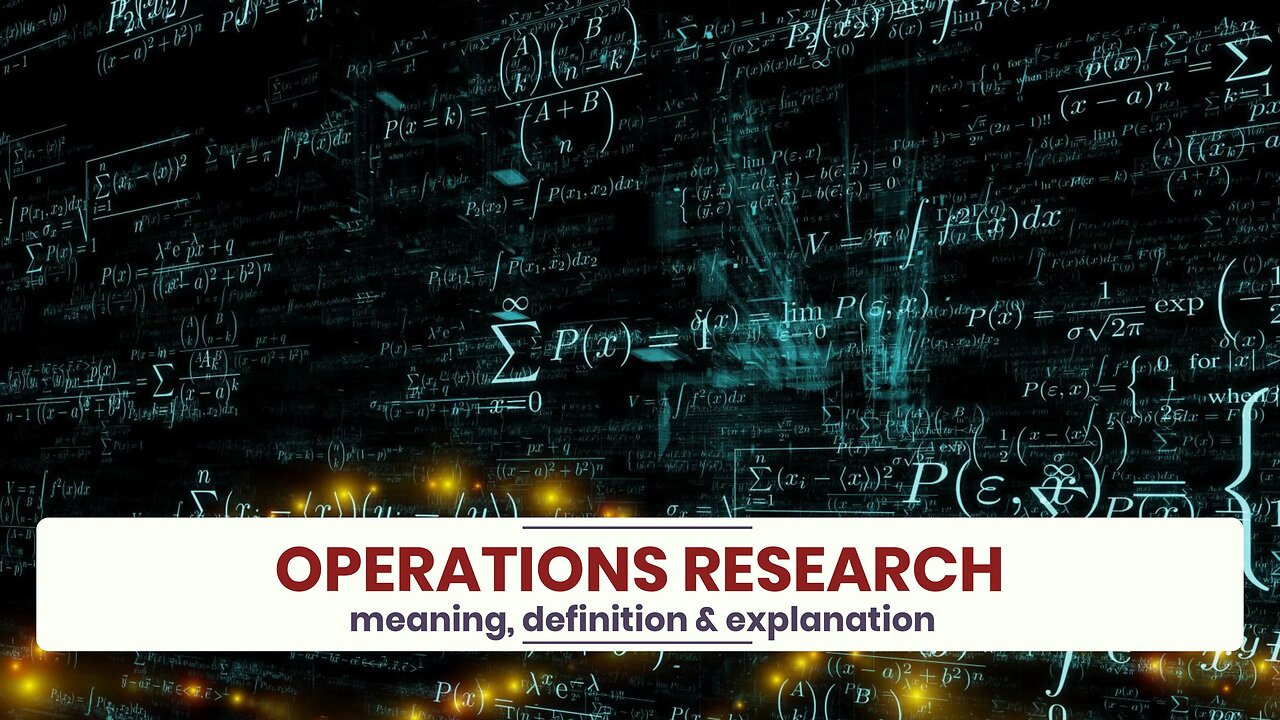Premium Only Content

What is OPERATIONS RESEARCH?
✪✪✪✪✪
http://www.theaudiopedia.com
✪✪✪✪✪
What does OPERATIONS RESEARCH mean? OPERATIONS RESEARCH meaning - OPERATIONS RESEARCH definition - OPERATIONS RESEARCH explanation. What is the meaning of OPERATIONS RESEARCH? What is the definition of OPERATIONS RESEARCH? What does OPERATIONS RESEARCH stand for? What is OPERATIONS RESEARCH meaning? What is OPERATIONS RESEARCH definition?
Operations research, or operational research in British usage, is a discipline that deals with the application of advanced analytical methods to help make better decisions. Further, the term 'operational analysis' is used in the British (and some British Commonwealth) military, as an intrinsic part of capability development, management and assurance. In particular, operational analysis forms part of the Combined Operational Effectiveness and Investment Appraisals (COEIA), which support British defence capability acquisition decision-making.
It is often considered to be a sub-field of mathematics. The terms management science and decision science are sometimes used as synonyms.
Employing techniques from other mathematical sciences, such as mathematical modeling, statistical analysis, and mathematical optimization, operations research arrives at optimal or near-optimal solutions to complex decision-making problems. Because of its emphasis on human-technology interaction and because of its focus on practical applications, operations research has overlap with other disciplines, notably industrial engineering and operations management, and draws on psychology and organization science. Operations research is often concerned with determining the maximum (of profit, performance, or yield) or minimum (of loss, risk, or cost) of some real-world objective. Originating in military efforts before World War II, its techniques have grown to concern problems in a variety of industries.
Operational research (OR) encompasses a wide range of problem-solving techniques and methods applied in the pursuit of improved decision-making and efficiency, such as simulation, mathematical optimization, queueing theory and other stochastic-process models, Markov decision processes, econometric methods, data envelopment analysis, neural networks, expert systems, decision analysis, and the analytic hierarchy process. Nearly all of these techniques involve the construction of mathematical models that attempt to describe the system. Because of the computational and statistical nature of most of these fields, OR also has strong ties to computer science and analytics. Operational researchers faced with a new problem must determine which of these techniques are most appropriate given the nature of the system, the goals for improvement, and constraints on time and computing power.
As a discipline, operational research originated in the efforts of military planners during World War I (convoy theory and Lanchester's laws). In the decades after the two world wars, the techniques were more widely applied to problems in business, industry and society. Since that time, operational research has expanded into a field widely used in industries ranging from petrochemicals to airlines, finance, logistics, and government, moving to a focus on the development of mathematical models that can be used to analyse and optimize complex systems, and has become an area of active academic and industrial research.
-
 1:26
1:26
The Audiopedia
1 year agoWhat is MOTTO?
55 -
 1:08:34
1:08:34
Jeff Ahern
1 hour agoThe Sunday Show with Jeff Ahern
1.49K1 -
 4:41
4:41
Sean Unpaved
1 hour agoNFL Week 8 Eye Openers
3.08K1 -
 25:57
25:57
The Kevin Trudeau Show Limitless
4 days agoThe Sound Of Control: This Is How They Program You
81.5K23 -
 LIVE
LIVE
GritsGG
5 hours agoQuads Win Streak Record Attempt 28/71 ! Top 70! Most Wins in WORLD! 3744+!
208 watching -
 LIVE
LIVE
Astral Doge Plays!
3 hours agoLuigi's Mansion 2 ~LIVE!~ Haunted Towers
66 watching -
 37:00
37:00
Tactical Advisor
2 hours agoNew Budget Honeybadger/Glock Discontinues All Models | Vault Room Live Stream 043
79.4K3 -
 LIVE
LIVE
TheItalianCEO
3 hours agoLast stream before Dreamhack
58 watching -
 LIVE
LIVE
Cripiechuccles
1 hour ago😁18+💚💙SUNDAY FUNDAY WITH CRIPIE💚RUMLUV💙👌SMOKING, GAMING & WATCHING FLICKS!:😁
42 watching -
 LIVE
LIVE
DoldrumDan
1 hour agoSACRED SEKIRO DAY 6 FIRST PLAYTHROUGH - DAY 24 NEW LIFE
5 watching